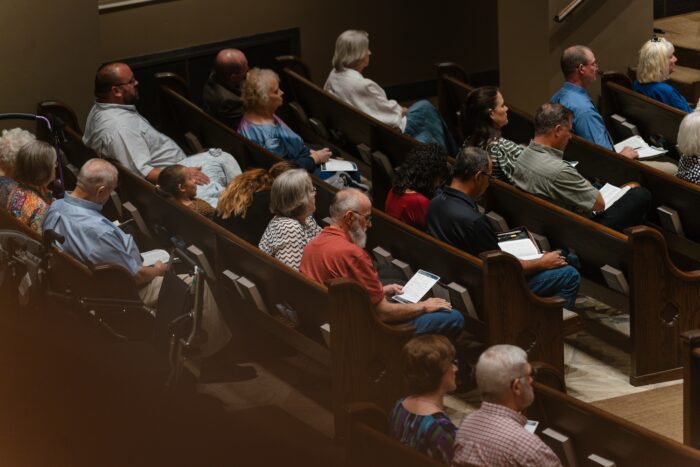Editor’s note: This year marks the centennial anniversaries of the Cooperative Program’s creation, the adoption of the Baptist Faith & Message, and the SBC’s ownership of Southwestern Seminary. To celebrate these 100 years of Southern Baptist cooperation, Southwestern has compiled eleven essays from key Southern Baptist leaders and seminary faculty for an original series on the ETC blog. The entire series, which will publish over the course of eleven weeks, will be available here.
Cooperation is essential to successful living. It involves working together in a shared task. For instance, successfully walking involves the cooperation of many body parts, including: eyes for direction, ear fluid for balance, brain for guidance and memory, and leg and foot bones, muscles, and tendons—all working in harmony. Since God made humans to be social creatures, cooperation is important in all interpersonal relationships: family, friendships, religious networks, vocation, and government. The New Testament (NT) gives many examples of cooperation. This article will demonstrate the importance of cooperation in the NT in four areas: (1) Jesus’s perfect example of ministry, (2) family relationships and roles, (3) intra-church relationships and ministries, and (4) inter-church ministries.
Jesus’s Perfect Example of Ministry
Jesus did not do His three-year ministry of healing, teaching, and preaching alone. Instead, He worked with a cohort of twelve disciples (mathētai, meaning “learners”), teaching and modeling ministry for them that included working together in cooperation. He gave them a perfect example by modeling cooperation with the other members of the Holy Trinity. He noted many times that God the Father sent Him.1 Jesus did works in the name of the Father (John 10:25), and He said what the Father told Him to say (John 8:28; 12:49–50). Sending the Holy Spirit to Jesus’s followers at Pentecost (Acts 2:4) was a cooperative effort: Jesus asked the Father, and the Father sent the Holy Spirit (John 14:16).
Jesus showed the disciples that cooperation was a key ingredient for success in spreading the Gospel. He sent out the Twelve (Matt 10:1–11:1; Mark 6:7–13, 30; Luke 9:1–6, 10) and later sent out the seventy (Luke 10:1–20). In both mission trips, he set up the need for cooperation. First, they went in pairs (Mark 6:7) who clearly must work together. Second, by having multiple teams cooperating in the same mission, they multiplied the number of people hearing the Gospel. Third, the twelve could not take money, bag, or extra clothes (Matt 10:9-10). The seventy could take “no purse, bag, [or] shoes” (Luke 10:4). They depended upon the hospitality of others, another cooperative endeavor (Matt 10:11; Mark 6:10; Luke 9:4). An additional cooperative support for Jesus and His disciples came from some women. Luke mentions Mary Magdalene, Joanna, and Susanna supported the ministry “out of their private means (Luke 8:3).” This help enabled Jesus and the disciples to minister without the need to be bi-vocational.
Of course, the disciples had some divisive moments, such as arguing over who was greatest (Luke 9:46–48; 22:24–26). Yet, Jesus used those times as teaching moments to stress the need for humility, teamwork, and servant leadership.
Family Relationships and Roles
Household codes of conduct were common in the Greco-Roman world. They described how a person should relate to other members of his or her household, which included parents, children, servants, extended family, and sometimes even business associates and neighbors. However, household codes in the NT differed from pagan ones in at least two ways.2 First, Christian relationships should be reciprocal; thus, showing a cooperation in roles and responsibilities. Second, everyone was an equal creation of God, so those considered stronger members should look after those who were weaker members: women, children, and servants. For instance, Paul told fathers not to “exasperate” their children (Col 3:21), who were to obey their parents (v. 20). Cooperation begins at home.
Intra-Church Cooperation
The Jerusalem church began in a spirit of cooperation as they met together for corporate worship, prayer, fellowship, meals, ministry, and pooling resources to help needy members (Acts 2:42; 4:32–37). A key word here is their “fellowship” (koinōnia), consisting of a “close association involving mutual interests and sharing.”3 The early church also worked together in sharing the Gospel daily (2:46; 4:1–4, 31, 33). As a result of this bold, united witness, the church quickly grew in number (2:41; 4:4).
Yet, as time went on, some churches fell into disunity. Paul wrote 1–2 Corinthians to a problem-filled church. The church at Corinth was sharply divided into groups (1 Cor 1:10–17), lived immature, fleshly lives (3:1–4), avoided church discipline (5:1–2), and abused the Lord’s Supper (11:20–34) and spiritual gifts, among other problems. Cooperation in ministry was key in Paul’s various solutions to their problems. They needed to have a proper understanding of their part in ministry (3:5–8), do good works (3:9–15), enact church discipline (5:3–5), and use their spiritual gifts in harmony and cooperation (12:14–31).
The spiritual giftedness of every Christian is a vivid example of the need for cooperation within a local body of Christ.4 No Christian has every spiritual gift because each gift is meant to work in concert with the other gifts in a local church (1 Cor 12:11, 29–30). Cooperation among Christians with different spiritual gifts in the church body is imperative. Paul illustrated this importance by comparing spiritual gifts to different parts of a human body. Just as a hand or foot can do nothing apart from its physical body, each Christian has a spiritual gift that depends upon the rest of the local church body to do any ministry. No part of the body should boast about or bemoan its position. Rather, they should work together in cooperation (1 Cor 12:14–30). A fitting verb describing such cooperation in the local body of Christ is synergeō, “working together” (1 Cor. 16:16; 2 Cor. 6:1).5 Peter wrote of the need for Christians to “serve each another” (diakonountes) by using their spiritual gifts (1 Pet 4:10).
Inter-Church Cooperation
Acts and the epistles show much cooperation between churches. The Jerusalem church greatly helped the Syrian Antioch church. First, Barnabas, a leader in the Jerusalem church, left there to find Paul and bring him to Antioch. Together they guided the new church at Antioch for about a year (Acts 11:25–26). After the first missionary journey, there arose a dispute over the conversion of Gentiles (14:26–15:2a). So, the church at Antioch sent Paul and Barnabas to Jerusalem to consult with the leaders there (“apostles and elders,” v. 2b). Thus, the Jerusalem Council, AD 49, was the first quasi “business meeting” in the early church. They resolved the issue that a Gentile did not need to become Jewish in order to follow Christ, and they sent a letter to Antioch with the positive news (vv. 22–34).
Paul’s missionary journeys involved cooperation among churches and their members. First, the church at Syrian Antioch obeyed the Holy Spirit to set aside Barnabas and Saul and send them out to do mission work (Acts 13:2–3). Second, continued prayer support of mission work was important. Paul asked churches for prayer on many occasions (Eph 6:19; Rom 15:30; 2 Cor 1:11; 1 Thess 5:25; 2 Thess 3:1; Phlm 22). Third, church financial support of the mission work was helpful, such as gifts from the church at Philippi (Phil 4:15–19), Corinth (2 Cor 1:16), and Rome (Rom 15:24). Fourth, showing hospitality to missionaries, such as providing food and lodging, enabled them to do their work (Acts 16:14–15, 34; 17:5–7; 3 John 5–9).
Fifth, Paul often called members of his missionary team as well as local church workers his synergos, “fellow worker,” a term denoting cooperation and collaboration in ministry (e.g., Rom 16:3, 21; Phil 4:3; Col 4:11). He sometimes mentioned coworkers, such as Timothy and Silas, in the prescription, the introduction, to a letter (2 Cor 1:1; 1 Thess 1:1; 2 Thess 1:1; Col 1:1). Paul also mentioned his “fellow workers” in the plural (synergoi) in the subscription, the conclusion of a letter, such as “Prisca6 and Aquila” (Rom 16:3) and “Mark, Aristarchus, Demas [and] Luke” (Phlm 24).7 In describing how he and Barnabas were “God’s fellow workers” (1 Cor 3:9), Paul noted how they each had specific tasks they did in evangelism and discipleship, likened to planting and watering (1 Cor 3:4–7). Sixth, the mission team gave a report to the church after the mission trip (Acts 14:26–28). This process was repeated in the next two mission trips, although the third journey ended in a Caesarea prison (18:22–23; 21–23).
Paul found an opportunity to help bring Jewish Christians and Gentile Christians together in unity. He collected this special offering over a period of several years. He wrote to the church at Corinth to take up an offering for the Jewish Christians in Jerusalem (1 Cor 16:1–4; 2 Cor 8–9). He collected and delivered this helpful gift (Rom 15:25–27).
Conclusion In the Gospels, Jesus modeled cooperation in ministry between God and His people. In Acts and the Epistles, the early church continued this cooperation in the church in Jerusalem and subsequent churches. Paul wrote that cooperation with others begins at home. In his missionary journeys, Paul and others benefited from the cooperation and collaboration of his fellow workers in supporting churches helping him with prayer, workers, and finances. Cooperation in the NT was a key ingredient to healthy individual Christians, local churches, and mission work. This same need for cooperation in ministry continues today.
- For instance, see Matt 10:40; Mark 9:37; Luke 4:18, 43; 9:48; 10:16; John 4:34; 5:23–24, 30, 36–39, 44, 57; 7:16; 8:16; 9:4; 12:44–45; 13:20, and a dozen other verses. ↩︎
- See the following NT household codes: Eph 5:22-6:9; Col 3:18-4:1; 1 Tim 2:8-15; 5:1-2; 6:1-2; Titus 2:1-10; 3:1; and 1 Pet 2:11-3:12. ↩︎
- BDAG, s.v., κοινωνία. ↩︎
- Paul wrote about spiritual gifts in 1 Cor 12-14; Rom 12:4-8; and Eph 4:11-12. ↩︎
- This verb also can describe God’s work with and in His people (Mark 16:20; Rom. 8:28; James 2:22). ↩︎
- Prisca is an alternate spelling of Priscilla. ↩︎
- See also Col 4:11. ↩︎








